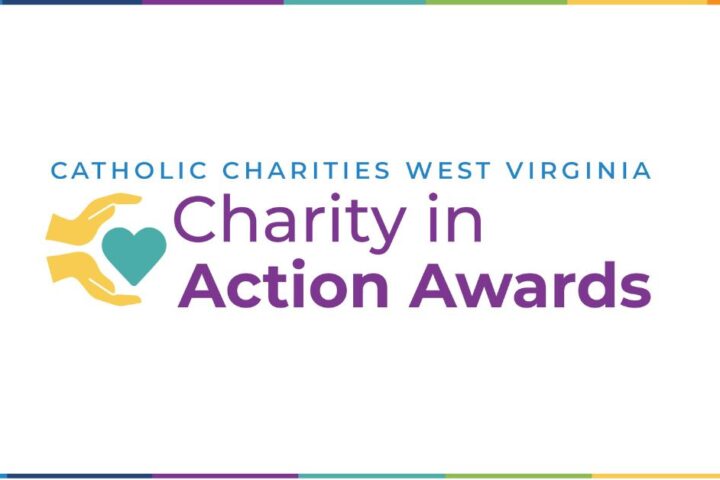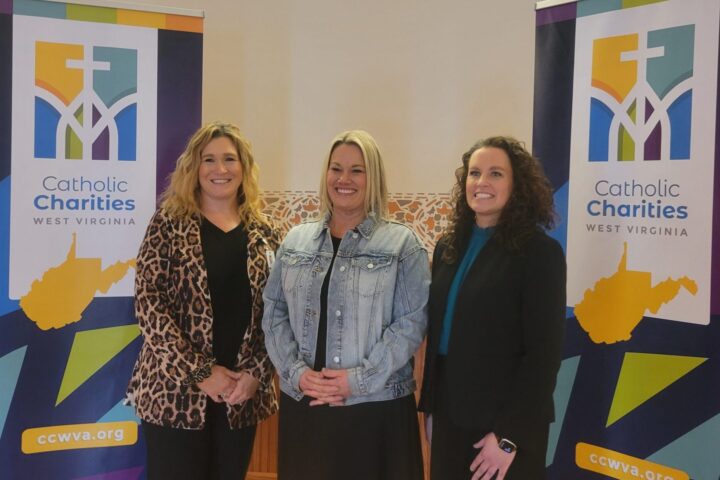by Katie Hinerman Klug
Building on the foundation of feeding the hungry, food programs have always been a core piece of Catholic Charities West Virginia’s (CCWVa) work to fulfill its mission. However, in recent years, the agency has begun to shift the way it views the solutions to food insecurity.
West Virginia as a whole ranks poorly in measures of health. Moreover, the rates of poor health and diseases such as diabetes tend to be higher in low-income, food insecure households. This is due, in part, to the higher prices of healthier foods, which leaves low-income families with little choice but to purchase cheaper foods high in sugar, trans-fat and refined grains.
Additionally, grocery stores are disappearing throughout Appalachia. Food deserts are a growing problem in West Virginia, and many people don’t have access to fresh produce and other healthy whole foods. People in numerous counties in West Virginia have some sort of limited food access, and this number is growing as more local grocery stores are unable to keep their doors open.

The challenge for many is multi-faceted. Those facing food insecurity often have a limited understanding about the benefits of nutritious food, and limited access to these foods as well. Thus, CCWVa’s approach is multi-faceted. The agency has shifted the way it views hunger solutions, and is becoming more focused on the quality of food provided rather than the absolute quantity.
Recent initiatives focus on healthier food options and an increased awareness about the benefits of good nutrition. The initiatives range from volunteer-driven ‘try this’ ideas to improving infrastructure to support the delivery of high quality fresh foods.
“Food is one of people’s most basic needs, and ensuring that those who are either on the verge of poverty or in poverty have nutritious food is an important part of our mission,” said Mark Sliter, Executive Director of CCWVa.
Several years ago, CCWVa launched an innovative program called WellnessWorks to promote healthier lifestyles among families and individuals requesting food. Staff recognized that many of those requesting pantry services had a limited awareness of the role of diet and nutrition in their quality of life. Literacy issues and lack of knowledge are barriers. Through the program, staff and volunteers can have conversations with clients about health concerns of the households, and then provide nutritional information and educational pieces about chronic illnesses and ways to manage them through healthy eating.
Another way that CCWVa provides assistance is through its Child Care Food Program, which assists childcare providers with serving healthy, fulfilling meals to the children in their care. The program also educates and assists caregivers in meal planning and applications for meal cost reimbursements through the USDA Child and Adult Care Food Program.
In a similar manner, CCWVa provides a link between government services and private citizens through the agency’s SNAP Outreach Program. In 2015, CCWVa was awarded the first USDA SNAP Outreach Grant for West Virginia. This grant, along with funding as a subgrantee of the Catholic Charities USA Walmart Foundation grant, enables CCWVa to expand its efforts to educate West Virginia families about the Supplemental Nutrition Assistance Program (SNAP)and provide eligible families with enrollment assistance.

Another creative solution to one of the causes of food insecurity in West Virginia is CCWVa’s Mobile Outreach Program. CCWVa has created this program to address the needs of the poor and low-income families in rural and isolated communities classified as food deserts by the USDA in a five county area. The majority of clients served in these counties are more than 40 miles from a supermarket.
The mobile food pantry van travels to these remote areas once per month on regularly scheduled days. The Mobile Outreach program also provides nutritional information and educational pieces. The program relies heavily on volunteer support to accomplish the mobile service provision. These staff and volunteers understand the need for nutritional support and bring their energy and ideas to the program. For instance, one volunteer donated slow cookers, and distributed these kitchen accessories through the mobile food pantry along with recipes to help clients recognize and try new ways to cook nutritious meals easily. The Mobile Outreach Program also received a grant that funded the purchases of herbs and spices. These seasonings were distributed to participants as supplements to the commonly used flavorings of salt and sugar. The new spices, including cinnamon, garlic powder, parsley and onion powder, expanded the cooking possibilities and options for flavoring food for those who receive food assistance.
“Providing healthy food in our food pantries, helping people receive the benefits they are eligible to receive, and bringing vital food assistance and nutritional guidance to food deserts in rural communities are important to providing comprehensive outreach services to those that are hungry,” said Sliter. “Our programs not only provide food for people, they also help them learn about healthy eating.”



